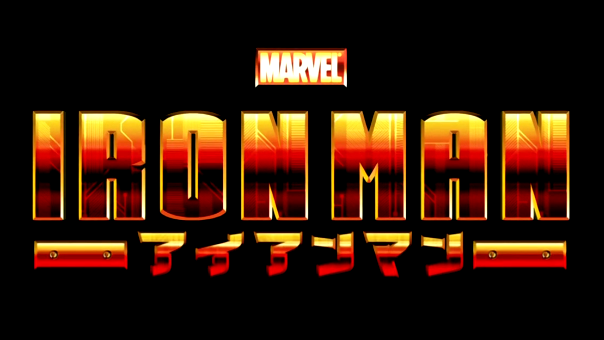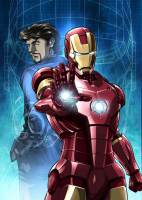 MAIN · EPISODE GUIDE · MEDIA · COVERAGE · BACKSTAGE · FORUM (Originally Posted July 29, 2011) The debut Marvel anime series make their premiere tonight on G4 starting with "Iron Man" at 11 p.m. ET and "Wolverine" at 11:30 p.m. ET! To celebrate the occasion, we spoke with Marvel Television's Manager of Development & Production for Marvel TV--as well as Associate Producer of both "Iron Man" and "Wolverine"--Megan Thomas Bradner. Read the full interview with the series' producer below! Question: What was the process like for selecting the voice actors for the English-language version of the anime? Megan Thomas Bradner: It was both easy and difficult. You want to capture the spirit of the original Japanese anime, but youíre also trying to balance it with other versions of the characters that have come before in the American market. It was easy in the sense that we had a pretty solid idea of what we needed from our protagonists, and what we were looking for in an actor. [Head of Marvel Television] Jeph [Loeb] had a history with Adrian [Pasdar] and Milo [Ventimiglia], and they seemed so perfectly suited for these versions of Iron Man and Wolverine. That came together pretty quickly, and it was actually more difficult to fill out the rest of the supporting cast.
Megan Thomas Bradner: It really was a collaboration in the truest sense of the word. Madhouse managed production of all the scripts, along with their partners at Sony Pictures Entertainment Japan. Madhouse and Sony approached Warren [Ellis] to give them an outline, to set them a course if you will, and then let the Japanese writers steer the ship. The Madhouse team had their own point-of-view of these Marvel characters and a story they wanted to tell that would make sense for the Japanese market. From there it was really just about walking the line between making sure this worked for Japan in terms of appealing to their culture, and also to people that are not familiar with the Marvel--or super hero--world, as well as staying true to the DNA of the Marvel Universe. Question: What will these new shows bring to Marvel that we may have not been able to achieve before? How is this project a new step for Marvel? Megan Thomas Bradner: These shows are made for an older demographic in Japan, one that we donít reach with Marvelís other animation offerings. Having an older audience allows us to delve into some of the more mature themes with these characters that we may see in the comics, but not as often in the rest of the animated Marvel Universe. The business side of Tony Stark and the result of Loganís violence are just two of the examples of things that we get to see. Question: How different from the source material are the Iron Man and Wolverine anime? Megan Thomas Bradner: The anime are definitely their own thing, although they take their inspiration from the classic Marvel Universe. "Iron Man" deals with similar issues that the comics have dealt with over the years, namely Tonyís struggle for absolution with his war mongering past, and the conflict over the idea that Iron Man technology can be used for good or ill depending on whoís using it. "Wolverine" takes the basis for its story from the classic Chris Claremont/Frank Miller limited series from the early '80s. We have the same destination, but the journey to get there is a little different. Question: How does presenting our beloved heroes in this new medium present a fresh look at them? What would still be familiar to the fans of Marvel watching the anime series for the first time? Megan Thomas Bradner: Whether itís for the American market or the Japanese market, you always have to take into consideration it might be someoneís first exposure to both the characters and the larger Marvel Universe--like the adage in comics that "every comic book is always someoneís first comic book"--so we always try to keep in mind that our shows need to be approachable for the lay-viewer. Of course we also want to make sure the things that real die-hard Marvel fans love are in the shows too. There are some in-jokes and comic references we put in. Does Wolverine look different than comic fans expect? Sure he does, but I donít think that irreparably damages who that character is at his core. We wanted to appeal to an audience unfamiliar with the character, and have it be this love story mixed with hyper-violence, so why not make him a hot younger guy? Go ahead, tell him heís too pretty to be Wolverine, and I guarantee heíll give you six shiny answers. In both these series, we meet the characters for the first time and try to really give you an idea of the "men behind the codenames" as they were before we set them on their journey. Tony is a debonair, charming playboy who happens to be a technological genius trying to atone for his past. Logan is this wounded soul, a man torn between his better nature and the animal within--he thinks heís found someone to share his life with and then sheís ripped away. I think both of those characters and stories are recognizable to fans of those characters from the comics as well as our other animated shows and feature films. Question: Were there any Marvel writers or artists who influenced the writing or art for the shows? Megan Thomas Bradner: Itís hard to just pick one! Warren Ellis provided the template for Madhouseís writers and was invaluable in terms of providing a foundation to launch from--although as artistic license is wont to do, in some instances they departed significantly from his outline. For "Iron Man," I gave them a lot of stuff byMatt Fraction and Salvador Larroca, as well as David Michelinie and Bob Layton. We gave them a lot of art from the Iron Man movies as well. For "Wolverine," of course their bible was the Chris Claremont/Frank Miller limited series.
Twitter - Facebook - Tumblr
LLC, a wholly-owned subsidiary of The Walt Disney Company, 2001 - 2013. Marvel Animation Age and everything relating to this site - copyright, 2013. Proudly hosted by toonzone. Contact us. |
